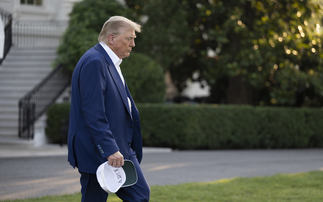Industry Voice: William Davies, Global Head of Equities at Columbia Threadneedle Investments, deconstructs the fear factors for 2019, from trade and interest rates to China, emerging markets and geopolitics.
There has been a significant de-rating of equities over what has been a disappointing 2018. Despite profit growth of more than 20% in the US (and around 10% elsewhere in the developed world), the US equity market has essentially been flat while other developed markets have broadly been off by about 10% in US dollar terms1. This has undone the strong performance we saw in 2017.
Why? Fear of several things: a full-blown trade war; rising yields; a China slowdown; and heightened geopolitical risk, including localised issues such as the Italian budget stand-off and Brexit. All of these factors have combined to destabilise markets and de-rate equities.
If any or all these issues do come to fruition, it would throw doubt on our growth expectations for 2019-20, and that in turn might suggest we are at the end of the cycle, which would be entirely consistent with equities de-rating. But all of this leads us to the central question: what do we actually believe will happen in 2019?
Deconstructing the fear factors
Trade is key among our concerns and is woven through each of the others. If the current stand-off is resolved, so the wider outlook will appear more positive - and vice versa. The worst-case scenario is a continued ratcheting up and broadening of tariffs, and the markets are certainly discounting a reasonably ugly outcome.
But will this occur? With such a volatile personality in the White House it is something of a fool's errand to make predictions. However, President Trump has in the past suggested he would prefer no or low tariffs over higher tariffs, but his chosen means to get a satisfactory deal from a US point of view has been to threaten - and he has followed through with these threats in a very real way. However, just as we saw with the revamped North American Free Trade Agreement - an 11th-hour deal between the US, Mexico and Canada to create the USMCA when none looked likely - it remains eminently feasible there will be a similar resolution with China and other nations.
We are mindful that the US presidential elections take place at the end of 2020, and Trump will not want to risk a sharp economic slowdown or recession going into the election cycle. This does not necessarily mean that Trump will need to resolve the trade stand-off immediately, but it perhaps requires him to ensure the situation does not escalate during 2019.
Our base case is that the worst-case trade scenario is less likely and it is possible that there is a sudden path to resolution, but putting a timeframe on this is tough. (See Addendum)
Interest rates
US bond yields rose above 3% this year and the fear here is that we will revisit further rises in 20192 . The fiscal stimulus we saw passed in the US at the back end of 2017 and implemented this year - delivered at a point in the cycle when additional impetus is not required - would suggest yields may go higher.
This move ought to be inflationary, especially when coupled with US unemployment at a 49-year low, which could see higher wage demands and rising inflation (indeed, we are seeing evidence of rising wages in the US and Japan)3. However, all the other fear factors are working to slow things down, along with structural issues such as ageing demographics, technology and disruption, so yields have not moved in the way we might have expected.
If there is a resolution to the trade issues, the prospect of stronger growth may lead us to be more concerned about slightly higher bond yields over the next 12 months, but if there is no resolution, it is fair to say we would not expect rates to move higher.
China and emerging markets
The trade stand-off has caused a slowdown in parts of the Chinese consumer economy, but we are still seeing reasonably strong growth. There has been a degree of fiscal stimulus from the Chinese government, though it is aimed more at bolstering the economy rather than turbo-boosting it. If the trade issues are resolved we might expect a period of Chinese tightening once again, or at least a reversal of the stimulus. However, if the stand-off continues we can expect an ongoing loosening to shore things up. But it is our belief that although having an impact, this is not significantly destabilising the global economy at this moment in time.
Emerging markets especially have been negatively affected over the past year. Part of the reason for this is the strength of the US dollar, but this is arguably passing as the effect of Trump's own fiscal stimulus rolls off, which will once again be supportive of broader emerging market equities as we move forward.
Geopolitics
We are living through a period in which several countries have dominant or strong leaders - from Trump to Vladimir Putin and Xi Jinping, and even Shinzo Abe is showing more nationalistic tendencies. When you get strong leaders who threaten in order to achieve their aims, tensions inevitably rise, and it fits that there will be a higher equity risk premium as a result.
Once again, though, if we see a resolution of trade issues it will likely release some of those tensions. But it remains entirely possible that other unforeseen issues will arise over the course of next year, and this might include anything from cyber security to disruptive elections, and would serve to further increase tensions between countries.
In Europe, two issues in particular continue to bubble along and have the potential to destabilise markets, although not on the same scale as the global trade war. In Italy, the budget stand-off could escalate, though it would be needlessly so in our opinion as the margins over which Italy and the European Commission are arguing are slight. Brexit, meanwhile, is decision spaghetti. In other words, there are a whole number of different outcomes and how we might end up there. But in all honesty, this is not a global problem: it's a European bump and a UK problem. But it can play out deleteriously on this local level.
The summary of all fears
Taking all these factors together, the common theme we are looking at most keenly in 2019 is trade. We believe an improvement here would be a big positive for equity markets but, conversely, if trade deteriorates markets will deteriorate too and the global environment will weaken.
Although our central case is that we are late cycle, we do not believe the end is nigh. We note there has been low growth in Europe and Japan this cycle, and although it has been a little higher in the US, we are loath to call a peak when there is a US election in 2020 and it is in the president's interest to enter that election cycle during a period of US growth.
If trade as an issue is managed in such a way that the worst-case scenario does not materialise - and it is certainly in the power of the world's leaders to be able to bring about a solution - then the outlook for 2019 may be more benign, with positive returns in equity markets the result.
Addendum, 3 December 2018
Since publication of this article, the US/China trade stand-off has developed. As we hypothesised, President Trump has sought to stop the worst-case trade scenario from developing by delaying for 90 days the imposition of increased trade tariffs from the start of 2019.
The apparently constructive rapprochement between himself and President Xi Jinping will allow for further negotiations, but this is not a permanent solution. Rather, it is a short-term delay with the potential to offer up a long-term resolution if the leaders can agree (or be seen to agree) mutually beneficial terms. But with precious few details on who might give up what, it is not any easier to foresee what a resolution may look like, or when it might occur.
However, this is undoubtedly a positive step, and helps open up the opportunity for an ultimately favourable resolution.
To find out more visit columbiathreadneedle.com/insights
1 Reuters, Mounting costs add to worries about 2019 US profit growth, 11 October 2018.
2 FT.com, US 10-year bond yield hits 3% ahead of Fed decision, 1 August 2018.
3 BBC, US jobless rate hits 49-year low of 3.7%, 5 October 2018
Important information: For investment professionals only, not to be relied upon by private investors. Past performance is not a guide to future performance. The value of investments and any income is not guaranteed and can go down as well as up and may be affected by exchange rate fluctuations. This means that an investor may not get back the amount invested. This material is for information only and does not constitute an offer or solicitation of an order to buy or sell any securities or other financial instruments, or to provide investment advice or services. The analysis included in this document has been produced by Columbia Threadneedle Investments for its own investment management activities, may have been acted upon prior to publication and is made available here incidentally. Any opinions expressed are made as at the date of publication but are subject to change without notice and should not be seen as investment advice. Information obtained from external sources is believed to be reliable but its accuracy or completeness cannot be guaranteed. This material includes forward-looking statements, including projections of future economic and financial conditions. None of Columbia Threadneedle Investments, its directors, officers or employees make any representation, warranty, guarantee or other assurance that any of these forward looking statements will prove to be accurate. Issued by Threadneedle Asset Management Limited (TAML). Registered in England and Wales, Registered No. 573204, Cannon Place, 78 Cannon Street, London EC4N 6AG, United Kingdom. Authorised and regulated in the UK by the Financial Conduct Authority. Columbia Threadneedle Investments is the global brand name of the Columbia and Threadneedle group of companies













